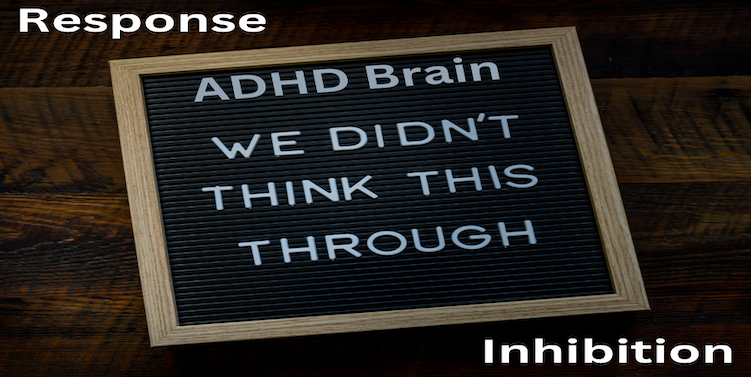
Written by Jennifer Cox LCPC
Last week we briefly discussed all the executive functions. Now let’s break them down a bit, this week we will talk about Response Inhibition, known as Impulse Control.
This is the ability to suppress actions that are inappropriate for situations or interfere with goals. The ability to inhibit or control impulsive responses and create more responses that utilize attention and reasoning.
In short, it is being able to stop and think before acting. Now, the lack of response inhibition can look different from person to person. A few examples include:
- Overspending
- Overeating
- Interrupting others/Blurting thing out
- Emotional Outbursts
- Fidgeting/Restlessness
- Being easily distracted
There are two main parts of the brain that are involved in Response Inhibition:
- The Prefrontal Cortex (PFC) is like the brain’s command center. It’s responsible for regulating emotion, decision-making, and motivation.
- The Thalamus acts as the brakes for the PFC, telling it when to slow down and evaluate the situation before making a decision.
There are also 2 different executive function systems that get involved with this process (Hot and Cold). They remind me of the DBT’s Wise Mind with ‘Hot’ being the Emotional Mind and ‘Cold’ being the Reasonable Mind.
- The Hot executive function (emotional mind) kicks in when emotional stakes are high. It’s your knee jerk reaction. It tells you how to feel and act based on the current situation. In these moments we let our emotions guide us.
- The Cold executive function (reasonable mind) uses logic and data. When this system is on, we’re able to process and evaluate all information and make decisions based on that analysis.
Unfortunately, in the ADHD brain, the message to slow down takes a bit longer and often doesn’t reach the PFC in time, meaning one ends up making decisions they may regret later (Hot EFs).
So, how does one move from Hot to Cold? Can one learn to pause and think, to bring the thalamus up to the front, to respond vs react?
One of the first steps would be building awareness – Reflect back on situations – Gain knowledge in regards to your thoughts, emotions, and behaviors:
- What are your emotional triggers? Think about the situations where you tend to make decisions you regret later (Emotional mind / Hot EFs). What were you feeling? What was the urge you felt?
- What are your environmental triggers? In these situations, consider the Who, What, and Where.
- How does your body respond to different emotions? For example, do you notice tension in specific areas?
- What were the consequences of your behaviors in these situations where you were impulsive?
Including the above reflection process, here are some day to day activities that could be helpful to increase your response inhibition:
-Teaching the use of waiting periods for things you want to do or have. You might consider having rewards for certain situations as a way to build in a waiting period before gratification.
-Figure out if the environment can be modified. Such as removing temptations or develop a cueing system to remind yourself of how to maintain self-control.
-Set up ‘If-Then’ plans – ‘If X occurs, then I will Y’. When you have the plans in place, you establish clear rules for how you would handle a particular situation.
-While engaged in conversations, repeat what the person is saying in your head to help maintain focus and allow yourself to process and prepare for your response.
Remember it:
*Takes practice
*Doesn’t happen over night
*Is hard work
The more you practice, the easier it becomes.
Understanding each of the executive functions and how they can impact your day to day, can help one understand why ADHD is a serious disorder – This is a disorder that involves self-control, self-care, self-regulation, and self-motivation to get through your day.
https://www.ncbi.nlm.nih.gov/pmc/articles/PMC5786525/
https://www.tandfonline.com/doi/abs/10.1080/13803390600678046
https://www.ncbi.nlm.nih.gov/pmc/articles/PMC8076773
For more information or help with executive functioning, contact 815-363-0864 or info@echcounseling.com

